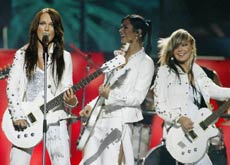
Switzerland placed eighth at Eurovision

Switzerland’s entry in the Eurovision Song Contest, the Estonian girl band Vanilla Ninja, has finished eighth in the competition in the Ukrainian capital, Kiev.
The contest, which took place on Saturday night and featured 24 countries, was won by Greece’s Helena Paparizou with the song My Number One.
Vanilla Ninja had come through the semi-finals to qualify strongly for the 50th Eurovision contest, with bookmakers tipping them as one of the favorites to win the competition.
The four-piece Estonian girl band gave a spirited performance of their song Cool Vibes and despite starting off well – they garnered the full 12 points from their homeland and neighbouring Latvia – they slipped down the rankings to finish eighth.
However, the result means that Switzerland goes straight into the final at next year’s competition in Athens.
Toni Wachter, head of entertainment at Swiss-German television, said he was happy with the “honourable result”. He said he hoped it would help relaunch Switzerland at the Eurovision competition.
“We may be able in the future to again motivate well-known groups to participate in the contest,” said Wachter.
Fulfilled mission
For their part, Vanilla Ninja said they were pleased with their eighth place. “We have fulfilled our mission: to help Switzerland and allow the country to qualify directly for the final of the next edition of the competition,” lead singer Lenna told Swiss television.
The result largely puts to rest last year’s disaster in which the Swiss entry, sung by Basel-based former hairdresser Piero Esteriore, crashed out of the semi-finals of the contest in the Turkish city of Istanbul.
But this year’s decision by Swiss television to steer clear of homegrown talent and send Vanilla Ninja to the competition caused an outcry, with the move being seen at the time as a slap in the face for Swiss bands.
Vanilla Ninja then became embroiled in a scandal when it emerged that their Swiss-born manager had manipulated the German hit parade. The band subsequently distanced themselves from David Brandes and their management was signed over to Cologne-based Christoph Helbig.
However, it is not the first time Switzerland has used foreign talent. In 1988 the then unknown Canadian Céline Dion won the 1988 contest for the country with Ne partez pas sans moi.
Multi-cultural
This year’s Greek winner was another example of a multi-cultural entry: Paparizou was born and lives in Sweden.
The singer had also been one of the favorites to win the song contest. The surprise runner-up was Malta’s Chiara, with Romania’s Luminita Anghel in third.
Paparizou received her prize from Ukraine’s President Viktor Yushchenko. Yushchenko became president after last year’s so-called Orange Revolution, which brought masses of demonstrators onto the streets to protest against what was widely seen as rigged presidential elections.
The country’s musical entry was Greenjolly, a rap group whose song We Won’t Stand This – No had become the unofficial anthem of the protests.
swissinfo with agencies
The first Eurovision song contest was held in Lugano, Switzerland, in 1956.
Singer Lyss Assia won the competition for Switzerland that year with Refrain.
Swedish pop group Abba became one of the most famous bands of all time after performing Waterloo at the 1974 contest.
Swiss group Peter, Sue and Marc entered the competition four times.

In compliance with the JTI standards
More: SWI swissinfo.ch certified by the Journalism Trust Initiative




























You can find an overview of ongoing debates with our journalists here . Please join us!
If you want to start a conversation about a topic raised in this article or want to report factual errors, email us at english@swissinfo.ch.